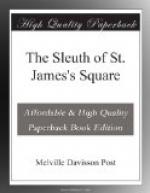“Yes,” I said, “I will save him!”
It was an impulse with no plan behind it. But the dabbing of the withered mouth on my fingers was like actual physical contact with a human heart.
For a moment she looked at me as one among the damned might look at Michael. Then she went slowly away, down through the wooded copse of the meadow. And I turned about to meet Marion. I knew that she was now after the identity of the wrecker, and I faced her to foul her lines.
“This is not the work of one with murder in his heart,” she said “A criminal agent set on a ruthless destruction of property and life would have drawn these spikes on a trestle or an embankment, at a point where the train would be running at high speed.”
She paused for a moment, then she went on speaking to me as though she merely uttered her mental comment to herself.
“These spikes are drawn at a point where the train slows down for a crossing and precisely where the engine would go off onto the hard road-bed of the highway into a level meadow. That means some one planned this wreck to result in the least destruction of life and property possible. Now, what class of persons could be after the effect of a wreck, exclusive of a loss of life?”
I saw where her relentless deductions would presently lead. This was precisely the result that a discharged foreign workman would seek in his reprisal. This man would have hot blood, the southern Europe instinct for revenge, but with such a mother, no mere lust to kill. I tried to divert her from the fugitive.
“Train robbers,” I said. “I wonder what was in the express-car?”
She very nearly laughed. “This is New York,” she said, “not Arizona. And besides there was no express-car. This thing was done by somebody who wanted the effect of a wreck, and nothing else, and it was done by some one who knew about railroads.
“Now, what class of persons who know about railroads could be moved by that motive?”
She was driving straight now at the boy I stood to cover. At another step she would name the class. Discharged workmen would know about railroads; they would be interested to show how less efficient the road was without them; and a desperate one might plan such a wreck as a demonstration. If so, he would wish only the effect of the wreck, and not loss of life. Marion was going dead ahead on the right line, in another moment she would remember the man we passed, and the “black band” letters. I made a final desperate effort to divert her.
“Come along!” I called, “the first thing to do now is to talk with Clinton Howard. The nearest telephone will be at Crewe’s house on the hill.”
And it won.
“Lisa!” she cried, “you’re right I We must tell him at once.”
We hurried down the track to the motor-car. I had gained a little time. But how could I keep my promise. And the next moment the problem became more difficult. The track boss came up with a short iron bar that his men had found in the weeds along the right of way.




